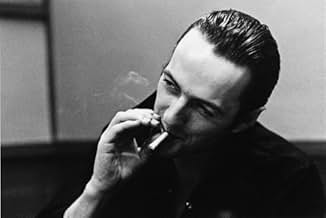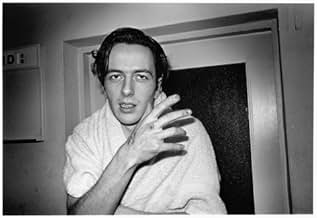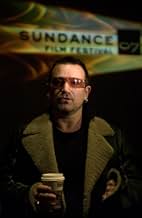CALIFICACIÓN DE IMDb
7.5/10
4.3 k
TU CALIFICACIÓN
Martin Scorsese, Bono, Jim Jarmusch, Flea y otras personas recuerdan la vida de Joe Strummer, cantante y guitarrista de la banda Clash.Martin Scorsese, Bono, Jim Jarmusch, Flea y otras personas recuerdan la vida de Joe Strummer, cantante y guitarrista de la banda Clash.Martin Scorsese, Bono, Jim Jarmusch, Flea y otras personas recuerdan la vida de Joe Strummer, cantante y guitarrista de la banda Clash.
- Premios
- 1 premio ganado y 4 nominaciones en total
Joe Strummer
- Self
- (material de archivo)
The 101ers
- Themselves
- (material de archivo)
Brigitte Bardot
- Self
- (material de archivo)
Mark 'Bez' Berry
- Self
- (as Bez)
Big Audio Dynamite
- Themselves
- (material de archivo)
The Clash
- Themselves
- (material de archivo)
Peter Cushing
- Winston Smith
- (material de archivo)
Opiniones destacadas
On December 22, 2002, at the ripe young age of 50, John Graham Mellor - better known as Joe Strummer, co-founder, lyricist, rhythm guitarist and lead singer for the group The Clash - died, rather prosaically, of a heart attack. I say "prosaically" because one would reasonably have envisioned a somewhat more "exotic" and "respectable" end for a punk rock artist of Joe Strummer's caliber. Yet, perhaps it's not quite so strange after all, for like many of his musical contemporaries, Strummer lived his life in the fast lane, perhaps burning so intensely for such a brief period of time that his battered and overstretched heart simply couldn't keep up with all the demands placed on it after awhile (actually, we're told he suffered from a congenital heart condition of which he had no knowledge and which could have taken his life at any time).
Whatever the cause of his demise, the documentary "Joe Strummer: The Future is Unwritten" provides a compelling and really quite exhaustive look into the life and career of this punk music legend. The movie starts at the beginning with Mellor's birth in Ankara, Turkey, to a father who was a British diplomat and a mother who was a nurse. He had a generally unhappy childhood, being whisked from one country to another before eventually being deposited in a British boarding school, seeing very little of his parents during the seven year period in which they were living abroad.
The movie then goes on to chronicle the death of his older brother by suicide; Mellor's enrollment in art college (where he changed his name to Woody and formed his first band, The Vultures); his time living as a squator in some abandoned row houses in West London with a group of fellow musicians with whom he formed his second band, the 101's; and his eventual turning away from Rockabilly and towards punk when The Sex Pistols opened for his group one night and forever altered Mellor's view of what music could be and do. By this time he had already changed his name a second time - now he was to be known as Joe Strummer - and had become extremely adept at writing lyrics and playing rhythm guitar.
It was at this point in 1976 that he essentially abandoned his former friends and hooked up with Mick Jones, Paul Simonon and Nicky Headon to form the band The Clash. The film then records the rise of that group, emphasizing the driving energy and social commentary of its music, as Strummer, through his lyrics, boldly took on the political and military establishment, decrying civil injustice and examining the very nature of authority itself. In fact, the movie makes it clear that the punk movement itself represented a revolt not just against society as a whole but against previous styles of music and fashion - and even one's old friends and way of life, including, in Strummer's case, his pre-Clash band mates, many of whom agreed to be interviewed for this film.
In the latter stages, the movie explores the paradox of success and celebrity, especially for performers who base their art on railing against the very things they find themselves endorsing in the end: namely, conformity, commercialism, fame and self-indulgence. For The Clash this was exemplified by the "sellouts" of going to America, of achieving international acclaim with their 1979 album "London Calling," and of writing "hit" songs (most notably, of course, "Rock the Casbah"). This accelerating artistic ambiguity led to increased personal tension among the members of the band and the eventual dissolution of the group. Towards the end of his life, Joe turned to marriage and fatherhood and a career in the film industry both as an actor and a composer. But any attempt to revive his career as a singer, at least at first, ended in failure - some would suggest a failure largely calculated and imposed by the man himself. Yet, in his final years, a much more tranquil and mellow Joe began to emerge, managing to make "peace" between the hippies and the punkers by establishing outdoor music fests - affectionately labeled "Joe's Campfires" - to help bridge the gap. And, as an appropriate finale to his life, he embarked on a well-received tour with his last band, The Mescaleros.
Director Julien Temple has put together a surprisingly dense and visually imaginative film, one that is heavily reflective of the turbulent times in which it is set. In addition to interviews with former lovers and friends of Strummer, the movie provides generous helpings of file footage and home movies, as well as clips from films like "If ," "Animal Farm," "1984," etc. whose subject matters parallel elements of Joe's life and the era in which he lived. Temple also frequently interjects into the narrative animated versions of cartoons Joe himself drew over the years. Moreover, a number of familiar faces - Bono, Matt Dillon, Steve Buscemi, John Cusack, Jim Jarmusch, Courtney Love (who appeared with Strummer in the movie "Straight to Hell"), even Johnny Depp in full Jack Sparrow regalia - stop by to throw their two-cents-worth in as to how profoundly they were influenced by Joe and the music of the Clash. And, of course, above it all there is the music
But the true coup here is getting Joe himself to comment posthumously on his own life, thanks to the ready availability of interviews he gave at crucial moments during his career. This allows us to hear the man relate his own story in his own words. It may be a story that ends sadly, but not before Joe seems to find some genuine peace in his life. And, seriously, how many documentaries about a rock star can one say THAT about?
Whatever the cause of his demise, the documentary "Joe Strummer: The Future is Unwritten" provides a compelling and really quite exhaustive look into the life and career of this punk music legend. The movie starts at the beginning with Mellor's birth in Ankara, Turkey, to a father who was a British diplomat and a mother who was a nurse. He had a generally unhappy childhood, being whisked from one country to another before eventually being deposited in a British boarding school, seeing very little of his parents during the seven year period in which they were living abroad.
The movie then goes on to chronicle the death of his older brother by suicide; Mellor's enrollment in art college (where he changed his name to Woody and formed his first band, The Vultures); his time living as a squator in some abandoned row houses in West London with a group of fellow musicians with whom he formed his second band, the 101's; and his eventual turning away from Rockabilly and towards punk when The Sex Pistols opened for his group one night and forever altered Mellor's view of what music could be and do. By this time he had already changed his name a second time - now he was to be known as Joe Strummer - and had become extremely adept at writing lyrics and playing rhythm guitar.
It was at this point in 1976 that he essentially abandoned his former friends and hooked up with Mick Jones, Paul Simonon and Nicky Headon to form the band The Clash. The film then records the rise of that group, emphasizing the driving energy and social commentary of its music, as Strummer, through his lyrics, boldly took on the political and military establishment, decrying civil injustice and examining the very nature of authority itself. In fact, the movie makes it clear that the punk movement itself represented a revolt not just against society as a whole but against previous styles of music and fashion - and even one's old friends and way of life, including, in Strummer's case, his pre-Clash band mates, many of whom agreed to be interviewed for this film.
In the latter stages, the movie explores the paradox of success and celebrity, especially for performers who base their art on railing against the very things they find themselves endorsing in the end: namely, conformity, commercialism, fame and self-indulgence. For The Clash this was exemplified by the "sellouts" of going to America, of achieving international acclaim with their 1979 album "London Calling," and of writing "hit" songs (most notably, of course, "Rock the Casbah"). This accelerating artistic ambiguity led to increased personal tension among the members of the band and the eventual dissolution of the group. Towards the end of his life, Joe turned to marriage and fatherhood and a career in the film industry both as an actor and a composer. But any attempt to revive his career as a singer, at least at first, ended in failure - some would suggest a failure largely calculated and imposed by the man himself. Yet, in his final years, a much more tranquil and mellow Joe began to emerge, managing to make "peace" between the hippies and the punkers by establishing outdoor music fests - affectionately labeled "Joe's Campfires" - to help bridge the gap. And, as an appropriate finale to his life, he embarked on a well-received tour with his last band, The Mescaleros.
Director Julien Temple has put together a surprisingly dense and visually imaginative film, one that is heavily reflective of the turbulent times in which it is set. In addition to interviews with former lovers and friends of Strummer, the movie provides generous helpings of file footage and home movies, as well as clips from films like "If ," "Animal Farm," "1984," etc. whose subject matters parallel elements of Joe's life and the era in which he lived. Temple also frequently interjects into the narrative animated versions of cartoons Joe himself drew over the years. Moreover, a number of familiar faces - Bono, Matt Dillon, Steve Buscemi, John Cusack, Jim Jarmusch, Courtney Love (who appeared with Strummer in the movie "Straight to Hell"), even Johnny Depp in full Jack Sparrow regalia - stop by to throw their two-cents-worth in as to how profoundly they were influenced by Joe and the music of the Clash. And, of course, above it all there is the music
But the true coup here is getting Joe himself to comment posthumously on his own life, thanks to the ready availability of interviews he gave at crucial moments during his career. This allows us to hear the man relate his own story in his own words. It may be a story that ends sadly, but not before Joe seems to find some genuine peace in his life. And, seriously, how many documentaries about a rock star can one say THAT about?
I absolutely love The Clash and, because I liked Temple's film about the Sex Pistols, I had high hopes for this. Like many other people, I found the campfire interviews completely unsatisfying, especially since none of the subjects are identified at all. We hear very little from Mick Jones and not all from Paul Simonon. On the other hand, we are treated to John Cusack and a pirate-costumed Johnny Depp. Matt Dillon shares a fascinating anecdote in which he recounts something a taxi driver once told him about Joe Strummer, and Anthony Kiedis tells us that Joe hired someone who used to drum for him. Gosh! If any of these people knew Joe in a meaningful way, they don't make that clear on screen. Why Bono and not Billy Bragg talking about Joe's political effect on his own music? Perhaps Julien Temple is hopelessly starstruck. The film's only redeeming features were the home movies, photographs, live performances and excerpts from Joe's BBC radio show.
This film is not worthy of the man who inspired it. I will keep my fingers crossed that another filmmaker, one who favours substance over style, will some day make the definitive Joe Strummer documentary.
This film is not worthy of the man who inspired it. I will keep my fingers crossed that another filmmaker, one who favours substance over style, will some day make the definitive Joe Strummer documentary.
10vez_kirk
Wow, I was blown away by this film. Despite having been born in 1990, and not having got into punk 'til 1 1/2 years after Joe's death (something I'm constantly kicking myself for), this film made me feel involved in his life + the '70s punk scene, as though I actually lived it. That's the sign of a pretty feckin' good film, if you ask me.
I found the format to be fantastically original (everything from having Joe 'narrate' through his radio show, to the use of his cartoons and the campfire interviews), the content was thorough but not overly concerned with trivial details, and it was just generally a warm, involving + insightful portrayal of Joe's life and the British punk scene.
Fantastic. See it.
I found the format to be fantastically original (everything from having Joe 'narrate' through his radio show, to the use of his cartoons and the campfire interviews), the content was thorough but not overly concerned with trivial details, and it was just generally a warm, involving + insightful portrayal of Joe's life and the British punk scene.
Fantastic. See it.
10robo-4
I have to admit I wasn't expecting too much from this documentary, but was really pleasantly surprised. It's not lightweight by any means and may prove difficult for the casual fan - definitely not popcorn material. The sheer amount of research and material that's gone into it is colossal and it could take many repeat viewings to take it all in.
I went away from the film feeling very uplifted and positive - Joe's attitude to life really makes you want to re-evaluate, and the film really captured that, particularly towards the end. Needless to say the soundtrack is absolutely fantastic as well - not just Clash/101-ers/Mescalaros material (which would be enough in itself!) but a really eclectic variety of music of influences from around the world and from many different ages.
I'm going to stick my neck out and declare this is the best music documentary ever made - it really did affect me that much.
I went away from the film feeling very uplifted and positive - Joe's attitude to life really makes you want to re-evaluate, and the film really captured that, particularly towards the end. Needless to say the soundtrack is absolutely fantastic as well - not just Clash/101-ers/Mescalaros material (which would be enough in itself!) but a really eclectic variety of music of influences from around the world and from many different ages.
I'm going to stick my neck out and declare this is the best music documentary ever made - it really did affect me that much.
Joe Strummer: The Future is Unwritten is maybe the first time one has seen a documentary done a "punk rocker" like this, where it's a story of the ups and downs and valleys and little peaks for a rock star done in the style of Eisenstein caught in the midst of a room covered with punk garb and an assistant with a mohawk. It mixes archival footage, interviews, movie footage from Animal Farm and 1984, Peter Cushing movies and Raging Bull, as well as a kind of loose structure formed out of 'London Calling' radio clips that Strummer did with his own music choices for his audience, and it's a mix that the suits the director wonderfully. His previous film was a revisionist take on the Sex Pistols- maybe the masterpiece of punk-rock docs, the Filth and the Fury- and the Future is Unwritten comes just as close to the subliminally, anger, trouble, and creative spirit that went with its subject matter.
Can anyone completely know Joe Strummer? Probably the same could go for Bob Dylan, who also has a movie about him out now that stretches the boundaries of cinema in I'm Not There. Temple raises questions for the fans of the Clash who might've not known certain things; that Strummer could be a very generous front-runner to the fans that needed help, and could also get p-od if his audience wasn't in some check with himself (or rather that they could be connecting with the audience and not some abstract rock-blob, which they feel they become by the time of Shea stadium); that towards the end of the Clash it was just Strummer and his management team (!); that Strummer anguished for the better part of a decade over how his career would go- this part I did know- that he went into some movies, made a horrible effort to get out of his record contract, and drifted in the tide of experiencing whatever for inspiration. His tale is more enigmatic than most, but as any artist he was many things at any time: moody to a fault, pushy, pleasant, quiet, frustrated, quixotic, and always with ideas that could come from anywhere, from Central American rebel uprisings to his walk from one place to another.
It is, more often than not, a sad film, probably more-so than the destructive tome on the Pistols, because Temple brings up many 'what-ifs', and a lot of the loneliness that could encompass Strummer (i.e. the scene when he's recording for days on end by himself in the studio shows him frayed and frazzled, as he sometimes appears in interviews too) and carried around him with, as any major rock and roll personality has, a rotten past and family history (father, brother, et all). But all those moments when Temple gets the audience to really feel the weight of the fact that such a man has been gone for good for five years now, he also reminds us brilliantly what he DID accomplish. There is a mark left from him, on his fans and on his loved ones and on the likes of Bono and Scorsese and (as funny as it is to see him Jack Sparrow-ed up) Depp, not to mention practically any *good* punk band.
Strummer was a thinking-man's punk, one who's lyrics could be taken into context of political and social significance, and had the stamina- along with his rowdy band-mates- to try and do what few rock bands could ever do: make a significant impact on consciousness, as if it were intuitive to do so. That they were eclectic didn't hurt either (even if, arguably, the Clash were more significant than the Mescaleros could ever be). And, in the end, the Future is Unwritten is mandatory viewing for anyone who gave a g*damn about the Clash or about the progression of the creative forces that started, actually, in folk and hippie music, progressed through punk, and went back out again into techno and, gasp, hippies and punks combined! It's daring for what's in-between the lines of the typical rock and roller story, and how Temple and his team make one of the best edited films of the year.
Can anyone completely know Joe Strummer? Probably the same could go for Bob Dylan, who also has a movie about him out now that stretches the boundaries of cinema in I'm Not There. Temple raises questions for the fans of the Clash who might've not known certain things; that Strummer could be a very generous front-runner to the fans that needed help, and could also get p-od if his audience wasn't in some check with himself (or rather that they could be connecting with the audience and not some abstract rock-blob, which they feel they become by the time of Shea stadium); that towards the end of the Clash it was just Strummer and his management team (!); that Strummer anguished for the better part of a decade over how his career would go- this part I did know- that he went into some movies, made a horrible effort to get out of his record contract, and drifted in the tide of experiencing whatever for inspiration. His tale is more enigmatic than most, but as any artist he was many things at any time: moody to a fault, pushy, pleasant, quiet, frustrated, quixotic, and always with ideas that could come from anywhere, from Central American rebel uprisings to his walk from one place to another.
It is, more often than not, a sad film, probably more-so than the destructive tome on the Pistols, because Temple brings up many 'what-ifs', and a lot of the loneliness that could encompass Strummer (i.e. the scene when he's recording for days on end by himself in the studio shows him frayed and frazzled, as he sometimes appears in interviews too) and carried around him with, as any major rock and roll personality has, a rotten past and family history (father, brother, et all). But all those moments when Temple gets the audience to really feel the weight of the fact that such a man has been gone for good for five years now, he also reminds us brilliantly what he DID accomplish. There is a mark left from him, on his fans and on his loved ones and on the likes of Bono and Scorsese and (as funny as it is to see him Jack Sparrow-ed up) Depp, not to mention practically any *good* punk band.
Strummer was a thinking-man's punk, one who's lyrics could be taken into context of political and social significance, and had the stamina- along with his rowdy band-mates- to try and do what few rock bands could ever do: make a significant impact on consciousness, as if it were intuitive to do so. That they were eclectic didn't hurt either (even if, arguably, the Clash were more significant than the Mescaleros could ever be). And, in the end, the Future is Unwritten is mandatory viewing for anyone who gave a g*damn about the Clash or about the progression of the creative forces that started, actually, in folk and hippie music, progressed through punk, and went back out again into techno and, gasp, hippies and punks combined! It's daring for what's in-between the lines of the typical rock and roller story, and how Temple and his team make one of the best edited films of the year.
¿Sabías que…?
- ConexionesFeatured in 'Joe Strummer': The Importance of Fire (2007)
Selecciones populares
Inicia sesión para calificar y agrega a la lista de videos para obtener recomendaciones personalizadas
- How long is Joe Strummer: The Future Is Unwritten?Con tecnología de Alexa
Detalles
- Fecha de lanzamiento
- Países de origen
- Sitios oficiales
- Idioma
- También se conoce como
- Joe Strummer: The Future Is Unwritten
- Productoras
- Ver más créditos de la compañía en IMDbPro
Taquilla
- Total en EE. UU. y Canadá
- USD 248,362
- Fin de semana de estreno en EE. UU. y Canadá
- USD 20,880
- 4 nov 2007
- Total a nivel mundial
- USD 1,193,491
- Tiempo de ejecución2 horas 4 minutos
- Color
- Mezcla de sonido
Contribuir a esta página
Sugiere una edición o agrega el contenido que falta

Principales brechas de datos
By what name was The Future Is Unwritten (2007) officially released in Canada in English?
Responda

































